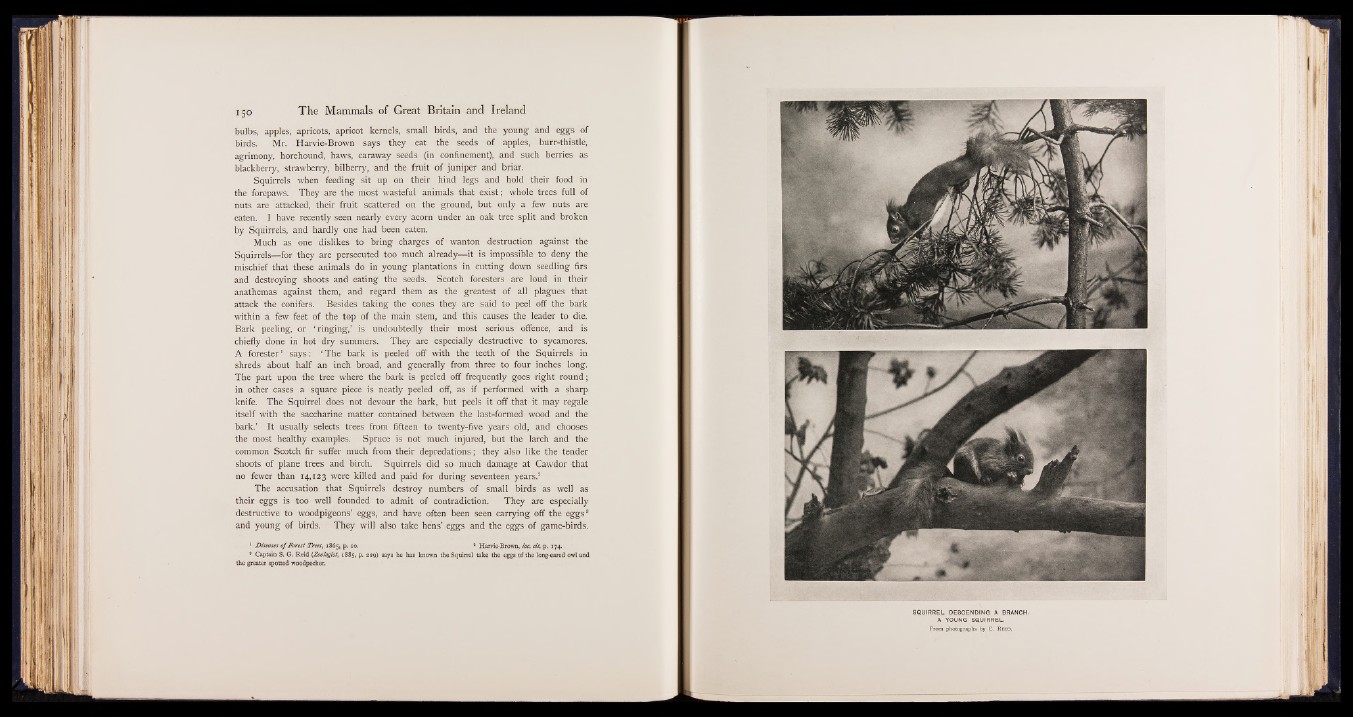
bulbs, apples, apricots, apricot kernels, small birds, and the young and eggs of
birds. Mr. Harvie-Brown says they eat the seeds of apples, burr-thistle,
agrimony, horehound, haws, caraway seeds (in confinement), and such berries as
blackberry, strawberry, bilberry, and the fruit of juniper and briar.
Squirrels when feeding sit up on their hind legs and hold their food in
the forepaws. They are the most wasteful animals that exist; whole trees full of
nuts are attacked, their fruit scattered on the ground, but only a few nuts are
eaten. I have recently seen nearly every acorn under an oak tree split and broken
by Squirrels, and hardly one had been eaten.
Much as one dislikes to bring charges of wanton destruction against the
Squirrels—for they are persecuted too much already—it is impossible to deny the
mischief that these animals do in young plantations in cutting down seedling firs
and destroying shoots and eating the seeds. Scotch foresters are loud in their
anathemas against them, and regard them as the greatest of all plagues that
attack the conifers. Besides taking the cones they are said to peel off the bark
within a few feet of the top of the main stem, and this causes the leader to die.
Bark peeling, or ‘ ringing,’ is undoubtedly their most serious offence, and is
chiefly done in hot dry summers. They are especially destructive to sycamores.
A forester1 say s : ‘ The bark is peeled off with the teeth of the Squirrels in
shreds about half an inch broad, and generally from three to four inches long.
The part upon the tree where the bark is peeled off frequently goes right round;
in other cases a square piece is neatly peeled off, as if performed with a sharp
knife. The Squirrel does not devour the bark, but peels it off that it may regale
itself with the saccharine matter contained between the last-formed wood and the
bark.’ It usually selects trees from fifteen to twenty-five years old, and chooses
the most healthy examples. Spruce is not much injured, but the larch and the
common Scotch fir suffer much from their depredations; they also like the tender
shoots of plane trees and birch. Squirrels did so much damage at Cawdor that
no fewer than 14,123 were killed and paid for during seventeen years.2 *
The accusation that Squirrels destroy numbers of small birds as well as
their eggs is too well founded to admit of contradiction. They are especially
destructive to woodpigeons’ eggs, and have often been seen carrying off the eggs8
and young of birds. They will also take hens’ eggs and the eggs of game-birds.
1 Diseases o f Forest Trees, 1865, p. 10. * Harvie-Brown, loc. cit. p. 174.
3 Captain S. G. Reid (Zoologist, 1885, p. 229) says he has known the Squirrel take the eggs of the long-eared owl and
the greater spotted woodpecker.